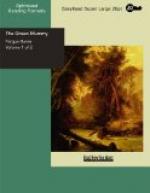“That is a wide margin,” grumbled the Coroner, jealous of his brother-practitioner. “Were there any, other wounds on the body?”
“No. You can see for yourself, if you have inspected the corpse.”
The Coroner, thus reproved, glared, and Widow Anne appeared after Robinson retired. She stated, with many sobs, that her son had no enemies and was a good, kind young man. She also related her dream, but this was flouted by the Coroner, who did not believe in the occult. However, the narration of her premonition was listened to with deep interest by those in the court. Widow Anne concluded her evidence by asking how she was to live now that her boy Sid was dead. The Coroner professed himself unable to answer this question, and dismissed her.
Samuel Quass, the landlord of the Sailor’s Rest, was next called. He proved to be a big, burly, red-haired, red-whiskered man, who looked like a sailor. And indeed a few questions elicited the information that he was a retired sea-captain. He gave his evidence gruffly but honestly, and although he kept so shady a public-house, seemed straightforward enough. He told much the same tale as had appeared in the newspapers. In the hotel on that night there was only himself, his wife and two children, and the staff of servants. Bolton retired to bed saying that he might start early for Gartley, and paid one pound to get the case taken across to river and placed on a lorry. As Bolton had vanished next morning, Quass obeyed instructions, with the result which everyone knew. He also stated that he did not know the case contained a mummy.
“What did you think it contained?” asked the Coroner quickly.
“Clothes and curios from foreign parts,” said the witness coolly.
“Did Mr. Bolton tell you so?”
“He told me nothing about the case,” growled the witness, “but he chatted a lot about Malta, which I know well, having put into that port frequent when a sailor.”
“Did he hint at any rows taking place at Malta?”
“No, he didn’t.”
“Did he say that he had enemies?”
“No, he didn’t.”
“Did he strike you as a man who was in fear of death?”
“No, he didn’t,” said the witness for the third time. “He seemed happy enough. I never thought for one moment that he was dead until I heard how his body had been found in the packing case.”
The Coroner asked all manner of questions, and so did Inspector Date; but all attempts to incriminate Quass were vain. He was bluff and straightforward, and told—so far as could be judged— everything he knew. There was nothing for it but to dismiss him, and Eliza Flight was called as the last witness.
She also proved to be the most important, as she knew several things which she had not told to her master, or to the reporters, or even to the police. On being asked why she had kept silence, she said that her desire was to obtain any reward that might be offered; but as she had heard that there would be no reward, she was willing to tell what she knew. It was an important piece of evidence.




